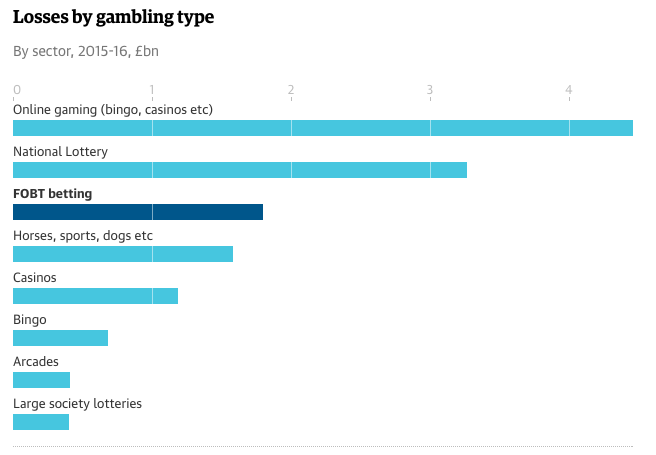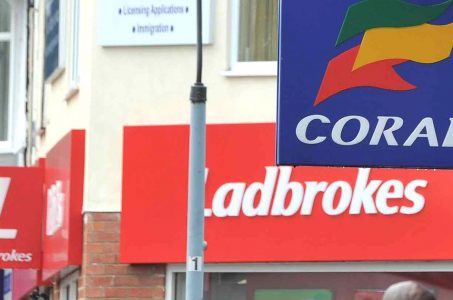British Gamblers Keep on Betting, as Casinos and Bookmakers Reap Profits
Posted on: May 29, 2017, 03:24h.
Last updated on: May 29, 2017, 03:25h.
British gamblers are betting more than ever. That’s good news for the casino industry, but maybe not so good for British real-money players, who lost a record £13.8 billion ($17.7 billion) for October 2015 through September 2016.

These numbers come from a report by the UK Gambling Commission, who released last week the latest “Industry statistics” document. Regulators saw a 2.9 percent increase over the previous year, and growth trend that is significant enough to force lawmakers across the UK to consider how British habits fit within commitments for social responsibility.
“The gambling industry demonstrates continued growth in most areas with the exception of bingo and the National Lottery,” according to the report.
The UKGC licenses more than 2,800 operators, almost 10 percent of which operate across multiple gambling sectors. Assessed in these biannual reports include operators in both live and online spaces. Poker results are included within the numbers for casino games.
Punto Banco Pound for Pound
The Department of Culture, Media and Sport will be looking closely at these numbers as they try to assess the real costs and benefits of gambling across the Great Britain, particularly as new technology plays a role in its growing ubiquity.
Some findings of preliminary interest include findings that online and mobile gambling is on the rise. The report revealed that online gambling constitutes 32 percent of the overall gambling market in Great Britain, driving £4.5 billion in gross gaming yield (GGY). Online casino games are responsible for £2.4 billion, with slots accounting for £1.6 billion of that. Sports and pari-mutuel betting through online or mobile devices totaled £1.9 billion, according to the report, with the predominance of wagers made on football (soccer) and horses.
The report also found that a previous drop in playing of casino games rebounded, increasing 23 percent to £988 million. This bounce back was primarily driven by UK Gambling Commission, a game also known as North American baccarat. Previously the lowest yielding gambling game in Great Britain (at £23.3 million), it grew to £213.6 million. Blackjack, meanwhile, saw a decline during that same time period, from £203.7 million to £187.6 million.
Also on the rise, were electronic games within the casinos, accounting for £166.1 million in casino win. This form of machine gaming is proving to be a cause for excitement, as well as a cause for concern.
Socially Responsible FOBTs
In a few weeks, the British government will release a long-awaited review of gambler behaviors and the gambling industry. It coincides with a call for research that asked for gamblers and gambling operators to submit numbers related to their experiences.
A key issue for analysis is the popularity growth of Fixed Odds Betting Terminals (FOBTs), which lawmakers want to determine whether or not they’re a drain on the British economy. With FOBTs allowing gamblers to bet up to £100 ($128) every 20 seconds on a variety of electronic casino-style games, both the Liberal Democrats and Labor parties alike are seeking to reduce the max bet to £2 ($2.57) if they win the general election.
Gambling opponents say FOBT gaming machines are the crack cocaine of betting, pointing out that British bettors are losing nearly £5 million ($6.4 million) a day on these machines.
British bookmakers and gambling supporters are balking at these assessments, however. The Association of British Bookmakers told the Guardian, “The increase in revenue from gaming machines in betting shops of 3 percent [compared with the last report] is in line with the average growth in revenue across the whole of the gambling industry and growth in the economy as a whole.”
They contend that a compromise of £10 or £20 for a max bet would be a more realistic limit on which they might be willing to settle.
Related News Articles
DraftKings, FanDuel Dominate Burgeoning NJ Sports Betting Market
Most Popular
Mirage Las Vegas Demolition to Start Next Week, Atrium a Goner
Where All the Mirage Relics Will Go
Most Commented
-
Bally’s Facing Five Months of Daily Demolition for Chicago Casino
— June 18, 2024 — 12 Comments
















No comments yet